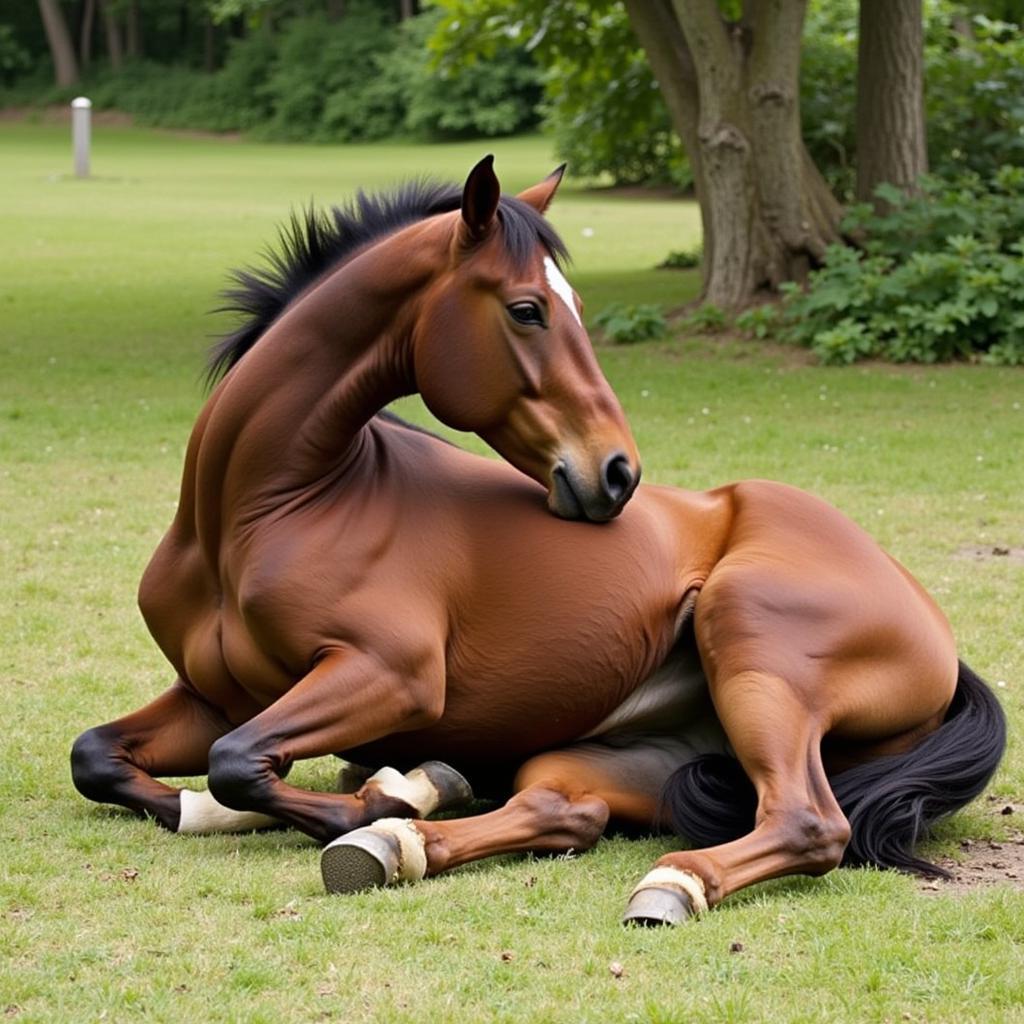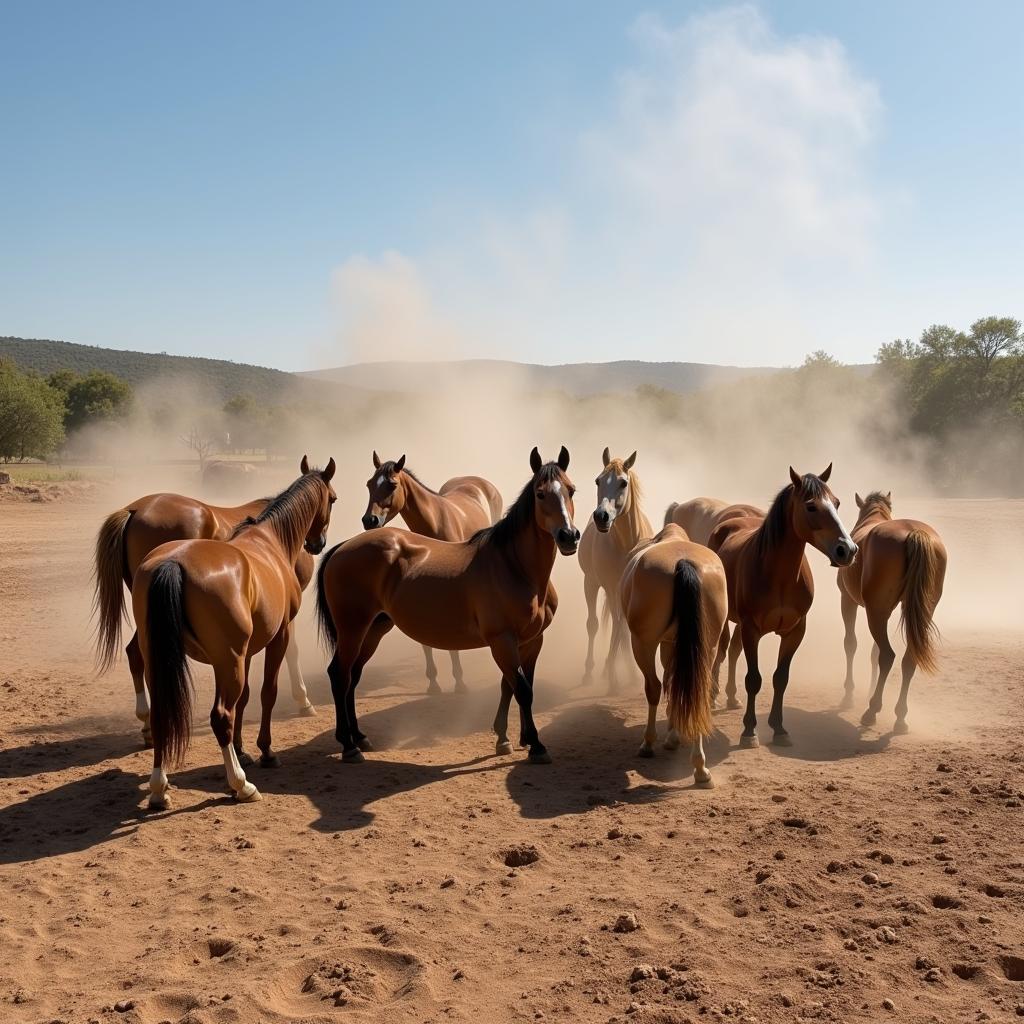Many horse owners have witnessed their equine companions happily rolling around in the dirt, leaving them wondering about the reason behind this seemingly joyful behavior. While it’s tempting to associate rolling with pure bliss, the truth is a bit more nuanced. So, Do Horses Roll When They Are Happy? Let’s delve into the fascinating world of equine behavior to find out.
It’s Not Just About Happiness: Understanding Why Horses Roll
While a good roll in the dirt can be an expression of contentment, there are various other reasons why horses engage in this behavior. It’s crucial to understand these reasons to ensure your horse’s well-being and address any potential underlying issues:
1. Natural Instincts for Grooming and Itch Relief
Horses, just like many other animals, have a natural instinct to groom themselves. Rolling in the dirt acts as a natural way for them to:
- Remove loose hair and dirt: The abrasive texture of dirt helps dislodge loose hair, dirt, and parasites from their coat.
- Scratch those hard-to-reach itches: Horses can’t reach every part of their body with their teeth or legs, so rolling provides a much-needed scratch for those itchy spots.
 Horse Scratching Back on Ground
Horse Scratching Back on Ground
2. Thermoregulation: Keeping Cool and Comfortable
Horses have a limited ability to sweat, making it challenging for them to regulate their body temperature, especially during warmer months. Rolling in the dirt helps them:
- Cool down: The dirt absorbs excess heat from their bodies, providing a cooling sensation.
- Dry off sweat: Rolling can help dry off sweat and moisture, further aiding in thermoregulation.
3. Shedding Season: Assisting with Coat Changes
During shedding season, horses naturally lose their winter coats. Rolling in the dirt can help:
- Loosen and remove dead hair: The friction from rolling helps to loosen and remove shedding hair more efficiently.
4. Social Signaling: Communicating Within the Herd
In a herd setting, rolling can also serve as a form of communication. Horses may roll:
- To establish dominance: A dominant horse might roll near a subordinate one as a way of displaying its higher rank.
- During courtship rituals: Rolling can be a part of the playful interactions between mares and stallions during mating season.
 Horses Rolling in Field
Horses Rolling in Field
Recognizing the Signs of a Happy Roller
While rolling can be triggered by various factors, certain signs indicate your horse is genuinely enjoying the activity:
- Relaxed body language: A happy horse will have a loose and relaxed posture, with their ears forward and their tail swishing gently.
- Playful rolling: They might roll back and forth multiple times, often accompanied by playful snorts or nickers.
- Seeking out specific spots: Some horses have favorite rolling spots, indicating a preference for the texture or location.
When to Be Concerned: Unhealthy Rolling Habits
While rolling is generally a natural and healthy behavior, excessive or unusual rolling can be a cause for concern. Consult your veterinarian if your horse:
- Rolls excessively and frantically: This could indicate skin irritation, allergies, or parasites.
- Seems distressed or in pain while rolling: This might suggest colic, gastric ulcers, or other medical conditions.
Ensuring a Safe and Enjoyable Rolling Experience
As a responsible horse owner, it’s essential to provide a safe environment for your horse to indulge in this natural behavior:
- Offer a clean and dry rolling area: Avoid areas with sharp objects, rocks, or excessive mud, which can cause injuries.
- Ensure proper drainage: This prevents the rolling area from becoming muddy and slippery.
- Monitor your horse’s behavior: Pay attention to their body language and rolling habits to identify any potential issues.
Conclusion: Rolling for Joy and Well-being
So, do horses roll when they are happy? The answer is yes, but it’s not the only reason. Rolling serves multiple purposes, from grooming and temperature regulation to social interaction. By understanding the various reasons behind this behavior, you can better care for your equine companion and ensure their overall well-being.
If you have any concerns about your horse’s rolling habits or any other aspect of their health, don’t hesitate to contact your veterinarian for personalized advice. After all, a happy horse is a healthy horse!
FAQs:
- Is it normal for my horse to roll every day? Yes, it’s perfectly normal for horses to roll daily, especially during warmer weather or shedding season.
- Should I stop my horse from rolling in the dirt? No, rolling is a natural and beneficial behavior. However, ensure a safe and clean rolling area.
- Can I provide my horse with a designated rolling area? Yes, you can create a designated rolling area with soft, dry dirt or sand.
- My horse seems to roll excessively after being ridden. Is this normal? It could be normal, especially if the horse is hot or itchy. However, excessive rolling could also indicate discomfort, so it’s best to consult your veterinarian.
- What should I do if my horse stops rolling altogether? A sudden change in behavior could indicate an underlying health issue. Consult your veterinarian for a check-up.
Need More Help?
For more information on horse care and behavior, check out these resources:
If you have any other questions or need assistance with your equine companion, don’t hesitate to reach out. Contact us at Phone Number: 0772127271, Email: [email protected], or visit us at QGM2+WX2, Vị Trung, Vị Thuỷ, Hậu Giang, Việt Nam. Our dedicated customer support team is available 24/7 to help you and your horse.